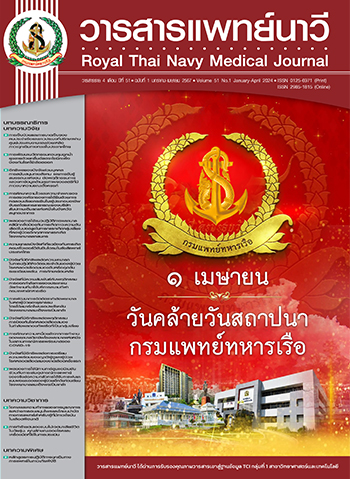The Influence of Personal Factors, Social Support, and Self-efficacy on Health Information-seeking Behavior in Pregnant Women with Gestational Diabetes Mellitus
Main Article Content
Abstract
The objective of this descriptive research was to study the influence of age, education level, family income, social support, and self-efficacy on the health information-seeking behavior of pregnant women with gestational diabetes mellitus. The conceptual framework of information-seeking behavior evolved by Wilson was used. The sample consisted of 125 women with gestational diabetes mellitus who met the inclusion criteria at the antenatal care unit at Siriraj Hospital. Data were collected using the general information questionnaire, the health information-seeking behavior questionnaire, the social support questionnaire, and the self-efficacy questionnaire. The descriptive statistical methods of frequency distributions, percentage, mean and standard deviation, and multiple regression statistics were used to analyze the data.
According to the findings, factors influencing health information-seeking behavior statistically significant were social support (β = 0.211, p = .036) and self-efficacy (β = 0.277, p = .007), which could explain the variation in health information-seeking behavior, 22.90% (R2 = 0.229, F = 5.826, p < .05). It was also found that the topics used for seeking information were about eating which was the number one, followed by gestational diabetes mellitus and symptoms of the disease. It was also discovered that the most used sources for information-seeking were general search websites (Google, Yahoo, etc.), followed by physicians and nurses or certificated diabetes mellitus education nurses.
For recommendations, the health care team should promote their self-efficacy and social support for pregnant women with gestational diabetes mellitus in order to have health information-seeking behavior in self-care. In addition, there should be knowledge sharing activities regarding gestational diabetes mellitus that involves disseminating information on the internet.
Article Details

This work is licensed under a Creative Commons Attribution-NonCommercial-NoDerivatives 4.0 International License.
References
Wilson TD. Human information behavior. Informing Science: The International Journal of an Emerging Transdiscipline 2000;3(2):49-55.
Carolan M. Women’s experiences of gestational diabetes self-management: a qualitative study. Midwifery 2013;29(6):637-45.
Carolan M, Gill GK. Steele C. Women’s experiences of factors that facilitate or inhibit gestational diabetes self-management. BMC Pregnancy Childbirth 2012;12(1):1-12.
Draffin CR, Alderdice FA, McCance DR, Maresh M, Harper R, McSorley O. Exploring the needs, concerns and knowledge of women diagnosed with gestational diabetes: a qualitative study. Midwifery 2016;40:141-7.
Siad FM, Fang XY, Santana MJ, Butalia S, Hebert MA, Rabi DM. Understanding the experiences of east African immigrant women with gestational diabetes mellitus. Can J Diabetes 2018;42(6):632-8.
Wah YYE, McGill M, Wong J, Ross GP, Harding AJ, Krass I. Self-management of gestational diabetes among Chinese migrants: a qualitative study. Women Birth 2019;32(1):e17-e23.
Harrison AL, Taylor NF, Frawley HC, Shields N. Women with gestational diabetes mellitus want clear and practical messages from credible sources about physical activity during pregnancy: a qualitative study. J Physiother 2019;65(1):37-42.
Sayakhot P, Carolan-Olah M. Internet use by pregnant women seeking pregnancy-related information: a systematic review. BMC Pregnancy and Childbirth 2016;16(1):1-10.
Hamzehei R, Kazerani M, Shekofteh M, Karami M. Online health information seeking behavior among Iranian pregnant women: a case study. Library Philosophy and Practice. [Internet]. [cited 2019 November 2]. Available from: https://digitalcommons.unl.edu/libphilprac/1659.
Santis M De, Luca C De, Quattrocchi T, Visconti D, Cesari E, Mappa I, et al. Use of the Internet by women seeking information about potentially teratogenic agents. Eur J Obstet Gynecol Reprod Biol 2010;151(2):154-7.
Gao LL, Larsson M, Luo SY. Internet use by Chinese women seeking pregnancy-related information. Midwifery 2013;29(7):730-5.
Cohen J. Statistical power analysis for the behavioral sciences. 2nd ed. New York: Routledge; 1988.
Shieh C, Broome ME, Stump TE. Factors associated with health information-seeking in low-income pregnant women. Women Health 2010;50(5):426-42.
Merrell LK. Exploration of the pregnancy-related health information seeking behavior of women who gave birth in the past year. [Dissertation, Department of Community and Family Health]. University of South Florida. [Internet]. [cited 2019 December 2]. Available from: https://digitalcommons.usf.edu/etd/6116/.
Phalasri A, Phahuwatanakorn W, Ratinthorn A. Predictive factors of anxiety in women with first diagnosed gestational diabetes mellitus. Journal of Nursing and Health Care 2015;33(2):15-22. (in Thai).
Surinprateep P, Ratinthorn A, Limruangrong P. Factors influencing pregnant women’s seeking of health information. Journal of Thailand Nursing and Midwifery Council 2019;34(4):95-107. (in Thai).
Guillory J, Niederdeppe J, Kim H, Pollak J, Graham M, Olson C, et al. Does social support predict pregnant mothers’ information seeking behaviors on an educational website? Matern Child Health J 2014;18(9):2218-25.
Song H, Cramer EM, McRoy S, May A. Information needs, seeking behaviors, and support among low income expectant women. Women Health 2013;53(8):824-42.
Das A, Sarkar M. Pregnancy-related health information-seeking behaviors among rural pregnant women in India: validating the Wilson model in the Indian context. Yale J Biol Med 2014;87(3):251-62.
Grimes HA, Forster DA, Newton MS. Sources of information used by women during pregnancy to meet their information needs. Midwifery 2014;30(1):e26-e33.


